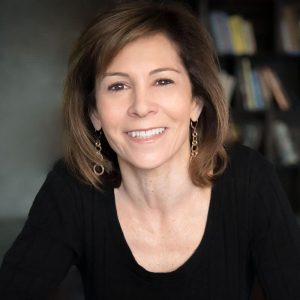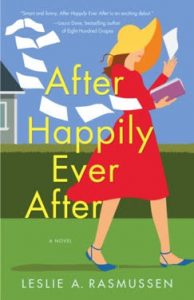SHE IS A WRITER Leslie A. Rasmussen
Leslie A. Rasmussen
Have you wondered what someone would say in their eulogy at your funeral? Would they describe what kind of person you were, or what you had accomplished? Would they have enough to say about you? When you are in the middle of your life and you look back at all the things you’ve done, or haven’t done, are you satisfied? I think about what advice I’d give to my twenty-year-old self, my thirty-year-old self, my forty-year-old self… well, you get the picture.
To my twenty-year-old self, I would say, have fun, don’t take on too many responsibilities, there’s time for that. I would tell myself to enjoy everything I was doing, which in my late twenties was writing for television sitcoms. I loved it, but worried about whether I was funny enough to keep moving up.
To my thirty-year-old self, I would say, “Now that you’ve decided to stop working and stay home with your children, remember to enjoy them.” Not that I didn’t, because my two boys were fun to be around, but the time goes by so quickly. I would tell myself not to worry about whether they ate enough vegetables, whether they made friends, whether they did their homework, and whether they cleaned the dirt out from under their nails.
To my forty-year-old self, I would say, “It’s okay to let your children go out into the world, do their own grocery shopping, and make their own decisions. You raised them right and they need to live their own lives.” (That is, until the pandemic hit, and they come back home to eat all your food and never want to leave again. But I digress.)
To my fifty-year-old self, I would say, “Your kids have left for college. You now have an empty nest. It’s your time.” But my time for what? I’d been so busy with college applications, buying things for their dorms and teaching them how to do laundry, that I didn’t think about what it would be like once they were no longer at home. I didn’t think about how quiet it would be. I didn’t think about how I would only have to go to the market once a week, and I wouldn’t even have done that, but I didn’t want my husband to starve. Or leave me for Colonel Sanders. Have you ever noticed that fast food mascots are almost always men? But I digress again.
As many other stay-at-home moms have, I’ve wondered what my new life would look like. I was hoping it would be the one where I was twenty and could eat anything without gaining weight, but that life was dead and buried. With this newfound freedom, I felt like the whole world was both open and closed to me. I had been out of the television writing business for so many years, that getting back in would be almost impossible. I thought about all the things I liked to do to see if any of them could be a career.
I didn’t think eating See’s candy was very realistic. So much of my life had been taken up by other peoples’ needs, and now I had to figure out what mine were. Maybe I could climb Kilimanjaro, but I remembered I was afraid of heights. Maybe I could go cross-country skiing, but I hated the cold. I felt like I was looking down a hole and not able to see into the abyss. Did I jump in and hope there’s either a soft mattress or a trampoline at the bottom?
Over the last few years, I had written personal essays for online sources, such as Huffington Post and Maria Shriver. I had been writing about things from my life, my experiences, my kids, my relationship with my husband. I realized that writing these essays made me happy. I was able to express myself in an honest way, and the people who were reading them, were commenting how much they related to what I was saying. I had been using my creative brain, which both fulfilled and energized me, the same way that writing television scripts used to.
I started going to writing conferences and listening to how authors developed their craft. At one of those conferences I met a writing coach and began taking her class. Through various writing prompts and exercises, a germ of an idea began to form in my brain, and I thought maybe I could write a novel. But I was scared, authors write novels. Then I realized that writers write novels, and I was a writer, wasn’t I?
I convinced myself that writing a novel would be the same as writing an exceptionally long sitcom script. That was naïve on my part. In a twenty-three-page script, the beginning, middle, and end are pretty close together, unlike a 250- to 300-page book. And in a script, the set designers, wardrobe people and director would make my words come to life. In a novel, I was completely responsible for the structure, the sets, the wardrobe, creating the characters and making sure the story worked. In television, I worked in a room of writers, where we pitched out a story together, then I’d go off and write it. Later I’d get back with the other writers, and together we’d get the script ready to be shot. Very few sitcom writers see every word they wrote show up on television. In a novel, however, they are all your words, and it’s easy to suffer over each one.
The first day I attempted to begin my novel, I saw a blank page on my computer screen and had the urge to go do laundry. To allay my fears, I wrote the first few chapters longhand on a legal pad, then typed them up. I should have started with an outline, the way I wrote all my scripts, but I was intimidated to write one for a whole book. I thought seeing it in print would mean I had to do what the outline said, so instead I wrote more than half the manuscript without having any idea where the second half was going. When I hit the middle of the book, I had no choice but to finally sit down and write an outline. I reminded myself that since I got to make every decision, nothing would be set in stone. I also figured out that having an outline provided me with a road map that could give me the confidence to keep going.
As time went on, I got to know my characters and they would talk to me at odd hours of the day and night. Instead of being woken up by a sick child, I was woken up by my protagonist who let me know she wanted to tell her best friend a secret. Or her father, who wanted to admit how scared he was about his health. At times, I was up at midnight, writing down notes on my phone, so I wouldn’t forget what my characters were whispering to me. If only they would leave me alone and write the book themselves while I got a good night’s sleep. They were not so kind, though. And they had minds of their own. I thought my novel was going to end one way, yet my protagonist didn’t agree with me, so she pulled me in another direction, a direction that I ended up being much happier with.
My novel, which is being published in April 2021, may have taken a while to finish, but the time went fast, and I’d still be four years older whether I’d written it or not. And if I hadn’t written it, I wouldn’t be as happy or as proud of myself. Plus, now I know what someone might say at my funeral: “She wrote a novel, even when she didn’t think she could do it. She is a writer.”
—
—
 Leslie A. Rasmussen was born and raised in Los Angeles, California. She graduated with a bachelor’s in communications from UCLA and went on to write television comedies for Gerald McRaney, Burt Reynolds, Roseanne Barr, Norm McDonald, Drew Carey, and Ralph Macchio, as well as The Wild Thornberrys and Sweet Valley High. Later, she earned a master’s degree in nutrition and ran her own business for ten years.
Leslie A. Rasmussen was born and raised in Los Angeles, California. She graduated with a bachelor’s in communications from UCLA and went on to write television comedies for Gerald McRaney, Burt Reynolds, Roseanne Barr, Norm McDonald, Drew Carey, and Ralph Macchio, as well as The Wild Thornberrys and Sweet Valley High. Later, she earned a master’s degree in nutrition and ran her own business for ten years.
Most recently, Leslie has written personal essays for online magazines such as Huffington Post, Maria Shriver, and SheKnows. She loves dogs and besides having two adorable Labradors, she volunteers at the Burbank Animal Shelter in Burbank, California. Leslie lives in Los Angeles and has two sons, and a husband she’s been with since college. This is her debut novel. She lives in Los Angeles.
Follow her on Twitter https://twitter.com/LeslieRAuthor
Follow her on Facebook: www.facebook.com/afterhappilyeverafter
Follow her on Instagram: @leslierauthor
AFTER HAPPILY EVER AFTER AFTER
 Maggie Dolin is forty-five and isn’t dealing with getting older very well. Seventeen years ago, she gave up her job in publishing to raise her daughter, Gia―but now her only child is about to leave for college, and Maggie isn’t sure what her new purpose will be. She’s been the caretaker and nurturer for so long that she can’t even remember the last time someone took care of her.
Maggie Dolin is forty-five and isn’t dealing with getting older very well. Seventeen years ago, she gave up her job in publishing to raise her daughter, Gia―but now her only child is about to leave for college, and Maggie isn’t sure what her new purpose will be. She’s been the caretaker and nurturer for so long that she can’t even remember the last time someone took care of her.
She wishes Jim, her husband of nineteen years, would take that role on―but he’s been distracted and disconnected, and she’s convinced he’s hiding something from her. Her self-involved, judgmental mother and resentful brother, meanwhile, are certainly no help, and her father―the only person in her life who’s always been there for her and asked nothing in return―is dealing with increasingly serious health issues, leaving Maggie without her rock.
As all these stressors pile on, a chance meeting with a younger man causes Maggie to act in a way that is completely out of character for her. As she gets deeper in, she’s forced to make some big decisions about what she wants and deserves―decisions that could change her life forever.
After Happily Ever After deals with love, marriage, family, the empty nest, aging parents and what happens when they all come crashing down at the same time.
BUY HERE
Category: Contemporary Women Writers, How To and Tips
























